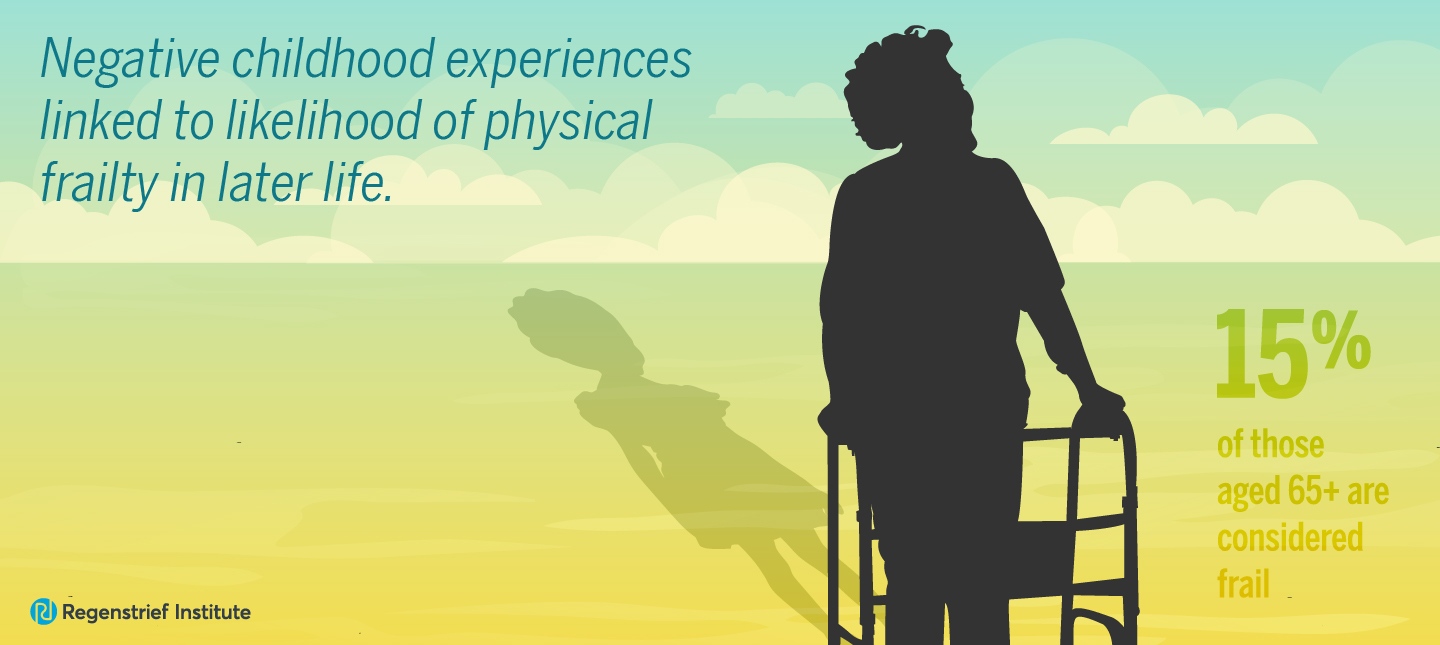Frailty is a serious concern in later-life adults due to its association with additional health risks including disability, falls, hospitalization and mortality. The prevalence of frailty has risen over time; about 15 percent of those aged 65 years and older are considered frail.
In one of the first studies to analyze the mediating effects of social relationships in the relationship between childhood experiences and frailty, Regenstrief Research Scientist Monica M. Williams-Farrelly, PhD, has found that negative childhood exposures can lead to lower levels of social support and social relationships, which can then lead to a higher likelihood of physical frailty in later life.
The researchers examined childhood experiences, before the age of 18, that were measured with responses to 29 questions, then categorized the responses into six childhood experience domains. The domains were socioeconomic status, risky parental behavior, risky adolescent behavior, childhood impairment, chronic disease in childhood and childhood infectious diseases.
Data from adults, 65 years and older who consented to physical measure testing during an enhanced face-to-face, in-home survey, was analyzed to determine the influence of the six domains of childhood experiences and social relationships on frailty trajectories over eight years.
“This study shows that if you experience some kind of unfortunate event in childhood, it is going to influence you in later life,” said Dr. Williams-Farrelly. “But the good note is: If you also manage to cultivate and maintain good, supportive and strong social relationships, that can help you reduce the relationship of negative experiences and potential higher likelihood of frailty.”
Lead author Dr. Williams-Farrelly suggests the following for parents whose children may have suffered from a negative exposure.
“If you play a supportive role in your child’s life and you know how to help your child cultivate good social skills and relationships, that should help to reduce the effects a negative childhood exposure may have on your child’s health in later life.”
One of the childhood experience domains, socioeconomic status, did not have a substantial effect on the relationship between negative childhood exposures and a higher likelihood of physical frailty in later life.
“It doesn’t appear that there’s a prominent relationship or difference between race or gender. But just because this paper doesn’t appear to have a race effect doesn’t mean it’s not present,” said Dr. Williams-Farrelly. “Similar to socioeconomic status (SES), in the childhood SES conversation, race is tied to a lot of systemic issues in the U.S., particularly for the older adults in this study. The older minorities in this population had to deal with Jim Crow laws and segregation as children. So just because you can’t see a relationship in this study certainly doesn’t mean it’s not there.”
“Early Origins of Frailty: Do Later-Life Social Relationships Alter Trajectories of Decline?” is published in the Journal of Aging and Health.
The study was supported by the National Institutes of Health’s National Institute on Aging and Purdue Research Foundation.
Data for this study was collected as part of the University of Michigan Health and Retirement Study, which is supported by the National Institutes of Health’s National Institute on Aging and the Social Security Administration.
Authors and their affiliations
Monica M Williams-Farrelly 1, 2, 3, Kenneth F Ferraro 4, 5
1 Department of General Internal Medicine and Geriatrics, Indiana University School of Medicine, Indianapolis, IN, USA.
2 Indiana University Center for Aging Research, Indianapolis, IN, USA.
3 Regenstrief Institute, Inc., Indianapolis, IN, USA.
4 Department of Sociology, Purdue University, West Lafayette, IN, USA.
5 Center on Aging and the Life Course, Purdue University, West Lafayette, IN, USA.
About Monica M. Williams-Farrelly
Monica M. Williams-Farrelly, PhD, is a research scientist at the IU Center for Aging Research at Regenstrief Institute. She is an early career scholar whose research interests focus broadly on the life course origins of health and health disparities. She completed her undergraduate studies at Butler University, received her M.A. from Indiana University – Indianapolis, and earned her PhD in sociology and gerontology from Purdue University. She also completed a postdoctoral fellowship at the Institute for Social Research at the University of Michigan.
About Regenstrief Institute
Founded in 1969 in Indianapolis, the Regenstrief Institute is a local, national and global leader dedicated to a world where better information empowers people to end disease and realize true health. A key research partner to Indiana University, Regenstrief and its research scientists are responsible for a growing number of major healthcare innovations and studies. Examples range from the development of global health information technology standards that enable the use and interoperability of electronic health records to improving patient-physician communications, to creating models of care that inform clinical practice and improve the lives of patients around the globe.
Sam Regenstrief, a nationally successful entrepreneur from Connersville, Indiana, founded the institute with the goal of making healthcare more efficient and accessible for everyone. His vision continues to guide the institute’s research mission.
About IU School of Medicine
IU School of Medicine is the largest medical school in the U.S. and is annually ranked among the top medical schools in the nation by U.S. News & World Report. The school offers high-quality medical education, access to leading medical research and rich campus life in nine Indiana cities, including rural and urban locations consistently recognized for livability.









